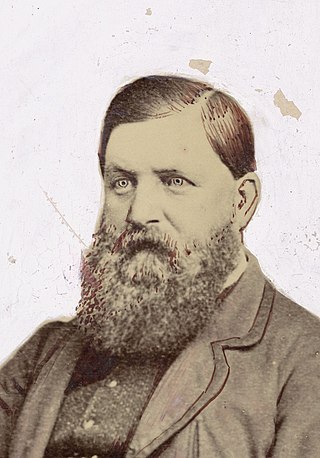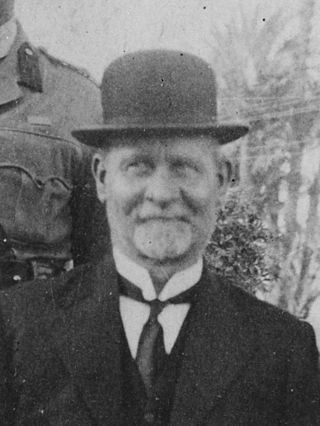Related Research Articles
The 2nd New Zealand Parliament was a term of the Parliament of New Zealand. It opened on 15 April 1856, following New Zealand's 1855 election. It was dissolved on 5 November 1860 in preparation for 1860–61 election. The 2nd Parliament was the first under which New Zealand had responsible government, meaning that unlike previously, the Cabinet was chosen by Parliament rather than by the Governor-General of New Zealand.
William Wells was a New Zealand politician.

Nelson Province was constituted in 1853 under the New Zealand Constitution Act 1852, and originally covered the entire upper South Island, including all of present-day Buller, Kaikoura, Marlborough, and Tasman districts, along with Nelson City, Grey District north of the Grey River, and the Hurunui District north of the Hurunui River. It was reduced in size by the creation of Marlborough Province in November 1859, then abolished in 1876, along with all the provinces of New Zealand.

William Henry Eyes was a British-born, New Zealand politician who was the fifth Superintendent of the Marlborough Province, and who represented the Wairau electorate in the New Zealand House of Representatives for many years. Born in England, Eyes had emigrated to Australia in 1839. He was jailed at Parramatta Gaol for a year before he was pardoned, after which he immediately emigrated to New Zealand.

Arthur Penrose Seymour was a 19th-century New Zealand politician from Picton. He was the 4th Superintendent of the Marlborough Province and was a member of the provincial government for all 16 years of its existence. With his strong advocacy for Picton, he successfully had the Seat of Government moved to Picton. When the Blenheim party secured a majority in the Provincial Council by 1865, Seymour negotiated the removal of the Seat of Government back to Blenheim.

Charles Houghton Mills was a member of parliament for Waimea and Wairau, in the South Island of New Zealand.
Motueka and Massacre Bay was one of the original parliamentary electorates created for the 1st New Zealand Parliament. It existed from 1853 to 1860 and was represented by three Members of Parliament. In the 1860 electoral redistribution, the area was split in half, and the Motueka and Collingwood electorates were created from it.
Marlborough is a former New Zealand parliamentary electorate, in the Marlborough region at the top of the South Island. It existed from 1938 to 1996, and was represented by five Members of Parliament.
Cheviot was a parliamentary electorate in the Canterbury region of New Zealand, from 1858 to 1890. It was named after what was then one of the country's largest sheep stations, Cheviot Hills.
Waimea-Picton was a parliamentary electorate in the Marlborough and Nelson Regions of New Zealand, from 1887 to 1893.
Waimea was a parliamentary electorate in the Nelson Province of New Zealand, from 1853 to 1887. Initially represented by two members, it was a single-member electorate from 1861.

Richard McCallum was a Liberal Party Member of Parliament in New Zealand, and later a member of the Legislative Council. A barrister from Blenheim, he held many local positions, including two years as Mayor of Blenheim. One of his main interests was the advancement of education.

Andrew James Richmond was a 19th-century Member of Parliament in Golden Bay / Mohua and Nelson, New Zealand.
James Balfour Wemyss was a 19th-century member of Parliament for Nelson, New Zealand.

Joseph Ward was a 19th-century Member of Parliament from Marlborough, New Zealand.

Henry Dodson was a brewer and a 19th-century Member of Parliament from Marlborough, New Zealand.

The mayor of Blenheim officiated over the borough of Blenheim, New Zealand. The office was created in 1869 when Blenheim became a borough, and ceased with the 1989 local government reforms, when Blenheim Borough was amalgamated with Picton Borough and Marlborough County Council to form Marlborough District. There were 31 mayors of Blenheim. The last mayor of Blenheim, Leo McKendry, was elected as the first mayor of Marlborough.
The Wairau by-election 1858 was a by-election held in the Wairau electorate during the 2nd New Zealand Parliament, on 21 May 1858. The by-election was caused by the resignation of incumbent MP William Wells and was won unopposed by Frederick Weld.

The Wairau by-election 1872 was a by-election held in the Wairau electorate during the 5th New Zealand Parliament, on 19 February 1872. The by-election was caused by the resignation of incumbent MP William Henry Eyes and was won by Arthur Seymour, who defeated Joseph Ward. Both candidates were prominent Marlborough politicians, and for both of them, this was their first attempt at election to the General Assembly.

The 21 June 1875 Wairau by-election was a by-election held in the Wairau electorate in the Marlborough Province during the 5th New Zealand Parliament. The by-election was caused by the resignation of incumbent MP Arthur Seymour and was won by Joseph Ward, who defeated William Sefton Moorhouse. Ward was a well-known politician in Marlborough. Moorhouse had political seniority over Ward and was at the time Mayor of Wellington, but had no personal connection to Marlborough.
References
- McRobie, Alan (1989). Electoral Atlas of New Zealand. Wellington: GP Books. ISBN 0-477-01384-8.
- Scholefield, Guy, ed. (1940). A Dictionary of New Zealand Biography : M–Addenda (PDF). Vol. II. Wellington: Department of Internal Affairs . Retrieved 18 October 2015.
- Wilson, James Oakley (1985) [First published in 1913]. New Zealand Parliamentary Record, 1840–1984 (4th ed.). Wellington: V.R. Ward, Govt. Printer. OCLC 154283103.